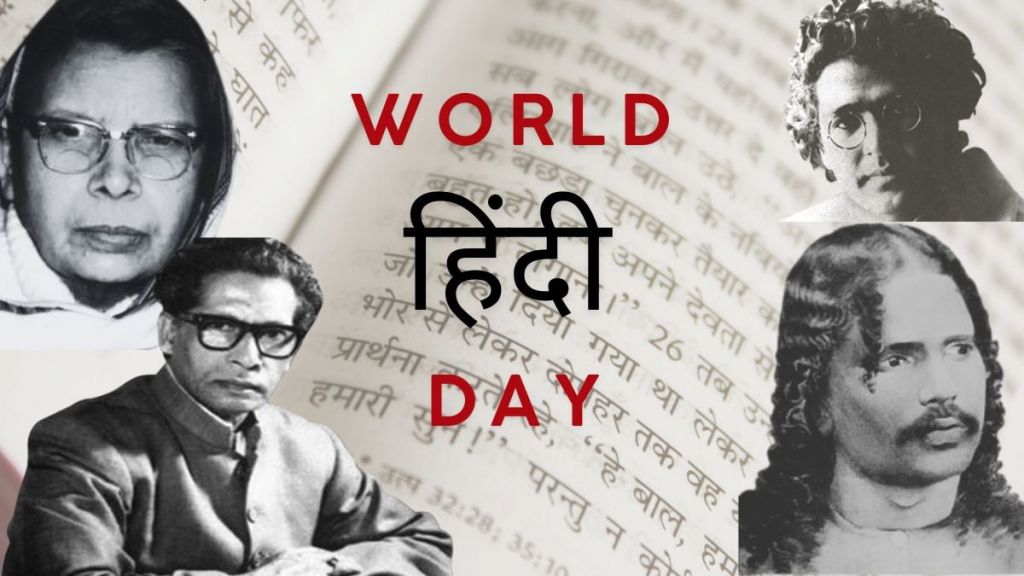
Every year, January 10 is celebrated as Hindi Day in memory of the inaugural World Hindi Conference that took place in Nagpur on Januar 10, 1975. On this day, the country celebrates Hindi and its cultural, literary, and global importance. It highlights the growing influence of the Hindi language and offers a chance to reflect on its development. Let’s honor a language that connects millions and commit to supporting it.
Let us delve into Indian authors who represented India and Hindi language and brought Hindi literature on the global platform.

Munshi Premchand
Dhanpat Rai Srivastava, known as Munshi Premchand, was a significant figure in modern Hindustani literature and a trailblazer in Hindi and Urdu social fiction. A teacher until 1921, he later participated in Gandhi's Noncooperation Movement. His first short novel, "Asrar-e-Ma'abid," published from 1903 to 1905, critiques the corruption of temple priests and the exploitation of women.
Premchand's legacy is celebrated through various mediums, such as Satyajit Ray's film "Shatranj ke Khiladi," which won the National Film Award for Best Feature Film in Hindi. Although Premchand did not win formal awards during his lifetime, initiatives like Premchand Fellowships and a commemorative postage stamp issued in 1980 honor his impact and an archival of all published works of Premchand written in Urdu and Hindi displayed in Jamia University. Notable works include Devasthan Rahasya, Gaban and Rangbhoomi amongst many more.

Bharatendu Harishchandra
Bharatendu Harishchandra, born in Benaras, is regarded as the father of Hindi literature and theatre. His father, Girdhar Das, was a poet, and Harishchandra showcased his literary talent by age 17. He edited several magazines and was recognized as "Bharatendu" in 1880. Writing under the pseudonym "Rasa," he addressed themes like poverty and exploitation under British rule. An influential journalist and traditionalist, he critiqued orthodoxy and religious leaders.
Harishchandra became a director and playwright, using theatre to influence public opinion with notable plays such as Satya Harishchandra and Andher Nagari. In his remembrance, the Ministry of Information and Broadcasting of India has given the Bharatendu Harishchandra Awards since 1983 to promote original writings in Hindi mass communication.

Amrita Pritam
Amrita Pritam was a prominent Indian novelist, poet, and essayist known for her work in Punjabi and Hindi. She was a significant figure in Punjabi literature, receiving the Sahitya Akademi Award in 1956 and penning over 100 works, including the famous poem "Ajj aakhaan Waris Shah nu" and the novel "Pinjar."
Pritam endured the chaos of the 1947 partition, relocating to India yet still cherished in Pakistan. In 1982, she was honored with the Jnanpith Award, one of the top literary accolades in India, for her work Kagaz Te Canvas ("The Paper and the Canvas"). In 1969, she received the Padma Shri and in 2004, she was honored with the Padma Vibhushan, which is India's second highest civilian honor. That same year, she received India's premier literary accolade from the Sahitya Akademi (India's Academy of Letters), the Sahitya Akademi Fellowship, presented to the "immortals of literature" for their lifetime achievements. She was the inaugural female recipient of the Sahitya Akademi Award for Punjabi literature.

Mahadevi Verma
Mahadevi Verma was a distinguished Indian poet, essayist, and short story writer in Hindi, renowned as a key figure in Hindi literature during the Chhayawadi period. Often referred to as the Contemporary Meera, she was celebrated by poet Nirala as "Saraswati within the grand temple of Hindi Literature." Her writings reflect India's pre-and post-independence landscape and contribute to social improvement and women's welfare. Verma's anthology Deepshikha deeply influenced both critics and readers.
She popularized a gentle vocabulary in the Hindi verse of Khadi Boli, a feat previously thought achievable only in Braj Bhasha. Besides literature, she was musically knowledgeable and served as the Principal of Prayag Mahila Vidyapeeth.
Awards:
1956: Padma Bhushan
1979: Fellowship from Sahitya Akademi
1982: Jnanpith Award for her anthology Yāmā.
1988: Padma Vibhushan Award
In addition to this, in 1979, renowned Indian director Mrinal Sen created a Bengali film based on her memoir Woh Chini Bhai called Neel Akasher Neechey. On 14 September 1991, the Government of India's Postal Department released a double stamp of ₹2 in her honor featuring Jaishankar Prasad.

Harivansh Rai Bachchan
Harivansh Rai Bachchan was a poet and author from India associated with the Nayi Kavita literary movement (romantic revival) in early 20th century Hindi literature. He was also a poet at the Hindi Kavi Sammelan. He is most recognized for his initial work Madhushala. He was Amitabh Bachchan's father. In 1976, he was honored with the Padma Bhushan for his contributions to Hindi literature.
Bachchan was proficient in various Hindi languages (Hindustani and Awadhi). He included a widely Hindustani lexicon, inscribed in Devanagari script. Though he couldn't read Persian letters, he was inspired by Persian and Urdu poetry, especially the works of Omar Khayyam. Famous works by the poet include Chal Mardane, Barsaat Ki Aati Hawa, Tera Haar, Madhushala, among several others. Bachchan's contributions have been featured in films and music. Verses from his poem "Agneepath" are included in the 1990 film Agneepath, starring his son Amitabh, and later in the 2012 remake Agneepath with Hrithik Roshan.

Sachchidananda Hirananda Vatsyayan, known as Agyeya (1911–1987), was a prominent Indian writer, poet, and literary figure in Hindi literature. Born in Uttar Pradesh, he was the son of archaeologist Hiranand Sastri and actively participated in the Indian freedom struggle, facing imprisonment for his revolutionary efforts. Agyeya contributed significantly to modern Hindi poetry and fiction, leading the Prayogavaad movement and editing the influential Saptak series. He launched the weekly Dinaman, setting new standards in Hindi journalism. He received prestigious accolades, including the Sahitya Akademi Award, Jnanpith Award, and Golden Wreath Award for poetry.
The Indian literature has many such authors, poets, writers, lyricists that have marked their significance in the evolution of Hindi as a language, literature, and culture. Af few renowned figures: Jaishankar Prasad, Makhanlal Chaturvedi, Mahavir Prasad Dwivedi, Mahadevi Verma, Dharamveer Bharti.